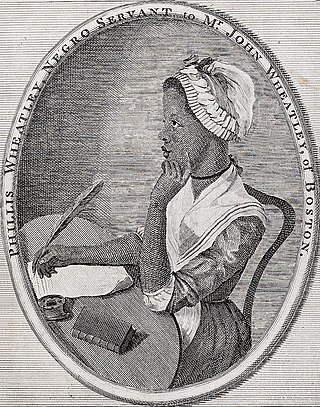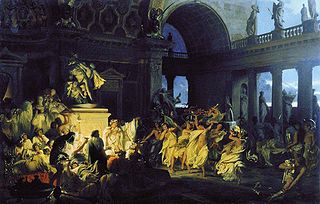In poetry, metre or meter is the basic rhythmic structure of a verse or lines in verse. Many traditional verse forms prescribe a specific verse metre, or a certain set of metres alternating in a particular order. The study and the actual use of metres and forms of versification are both known as prosody.

Poetry, also called verse, is a form of literature that uses aesthetic and often rhythmic qualities of language − such as phonaesthetics, sound symbolism, and metre − to evoke meanings in addition to, or in place of, a prosaic ostensible meaning. A poem is a literary composition, written by a poet, using this principle.

Phillis Wheatley Peters, also spelled Phyllis and Wheatly was an American author who is considered the first African-American author of a published book of poetry. Born in West Africa, she was kidnapped and subsequently sold into enslavement at the age of seven or eight and transported to North America, where she was bought by the Wheatley family of Boston. After she learned to read and write, they encouraged her poetry when they saw her talent.

The word decadence, which at first meant simply "decline" in an abstract sense, is now most often used to refer to a perceived decay in standards, morals, dignity, religious faith, honour, discipline, or skill at governing among the members of the elite of a very large social structure, such as an empire or nation state. By extension, it may refer to a decline in art, literature, science, technology, and work ethics, or to self-indulgent behavior.

John Robinson Jeffers was an American poet, known for his work about the central California coast. Much of Jeffers's poetry was written in narrative and epic form. However, he is also known for his shorter verse and is considered an icon of the environmental movement. Influential and highly regarded in some circles, despite or because of his philosophy of "inhumanism", Jeffers believed that transcending conflict required human concerns to be de-emphasized in favor of the boundless whole. This led him to oppose U.S. participation in World War II, a stance that was controversial after the U.S. entered the war.
Arthur Yvor Winters was an American poet and literary critic.
Stanford University Press (SUP) is the publishing house of Stanford University. It is one of the oldest academic presses in the United States and the first university press to be established on the West Coast. It is currently a member of the Association of University Presses. The press publishes 130 books per year across the humanities, social sciences, and business, and has more than 3,500 titles in print.
William "Bill" Everson, also known as Brother Antoninus, was an American poet, literary critic, teacher and small press printer. He was a member of the San Francisco Renaissance.

Marian Hall Seldes was an American actress. A five-time Tony Award nominee, she won the Tony Award for Best Featured Actress in a Play for A Delicate Balance in 1967, and received subsequent nominations for Father's Day (1971), Deathtrap (1978–82), Ring Round the Moon (1999), and Dinner at Eight (2002). She also won a Drama Desk Award for Father's Day.

The Decadent movement was a late-19th-century artistic and literary movement, centered in Western Europe, that followed an aesthetic ideology of excess and artificiality.
Nationality words link to articles with information on the nation's poetry or literature.

Tor House and Hawk Tower are buildings in Carmel-by-the-Sea, California, United States. They were the home of poet Robinson Jeffers and family from 1919 to 1999.
Robert Michael Zaller is an American author whose works include volumes of history, criticism, and verse. He is Drexel Distinguished University Professor of History Emeritus, and has been active as an opponent of the death penalty.

Leigh Austen Wiener was an American photographer and photojournalist. In a career that spanned five decades, he covered hundreds of people and events. His images captured the public and private moments of entertainers, musicians, artists, authors, poets, scientists, sports figures, politicians, industrialists, and heads of state, including every U.S. president from Harry Truman to Ronald Reagan and illustrated every sector of industry including farming, steel mills, auto manufacturing, aerospace, medicine, research, early computing and semi-conductor manufacturing.

In Defense of Reason is a three-volume work of literary criticisms by the American poet and literary critic Yvor Winters. First published in 1947, the book is known for its meticulous study of metrical verse and for its examples of Winters' system of ethical criticism.

Radcliffe Squires was an American poet, writer, critic, and academic. He published several well-regarded books of poetry, as well as biographical and critical works which focused on highly acclaimed 20th-century writers.

"Birds and Fishes" is a poem by the American and Californian writer Robinson Jeffers. It is included in The Beginning and the End and Other Poems, published posthumously in 1963.
Tamar is an epic poem by the American writer Robinson Jeffers, first published in 1924. A tale of incest and violence, it follows Tamar Cauldwell, the daughter of a Californian ranch family, as she experiences transgression, hatred, and destruction. Tamar was the first unrhymed narrative poem Jeffers wrote. The story makes references to the biblical Books of Samuel and deals with themes of nature and corruption.
Yom Kippur 1984 is a poem by the Jewish-American poet Adrienne Rich. One of Rich's key poems, it was reprinted in her 1986 collection Your Native Land, Your Life.












